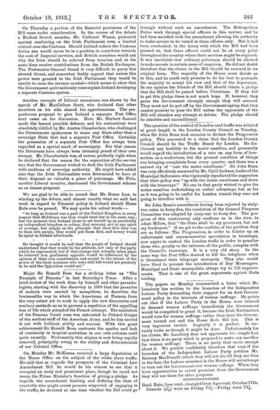On Monday Mr. McKenna received a large deputation at the
Home Office on the subject of the white slave traffic. He said that as regards the prospects of the Criminal Law Amendment Bill he would do his utmost to see that it occupied an early and prominent place, though he could not usurp the Prime Minister's function of giving a pledge. As regards the amendment limiting and defining the class of constable who might arrest persons suspected of engaging in the traffic, he doubted at one time whether the Bill could go through without such an amendment. The Metropolitan Police work through special officers in this matter, and he had been satisfied with the amendment allowing the authority to make arrests to be vested in these officers only. But it had been overlooked, in the hurry with which the Bill had been pressed on, that these officers could not be at every point throughout the country where their services might be required. It was inevitable that ordinary policemen should be allowed to make arrests in certain cases of suspicion. He did not doubt therefore that the clause in the Bill should be restored to its original form. The majority of the House must decide as to this, and he could only promise to do his best to persuade the majority to accept his view and that of the deputation. In our opinion the friends of the Bill should obtain a pledge that the Bill shall be passed before Christmas. If they fail to get this pledge there is not much hope. If, however, they press the Government strongly enough they will succeed. They must not be put off by the Government saying that they cannot promise to pass the Bill unless the opponents of the Bill will abandon any attempt at debate. The pledge should be absolute and unconditional.














































 Previous page
Previous page